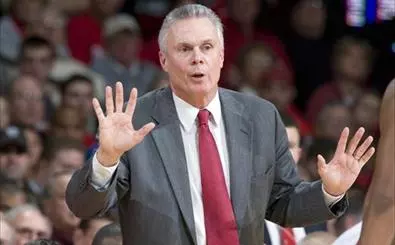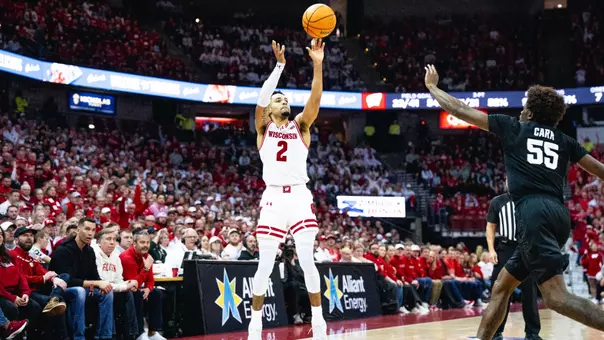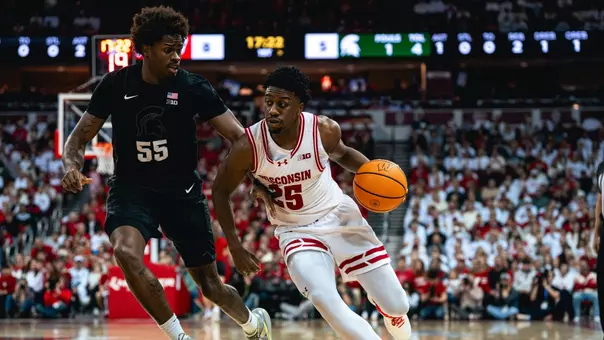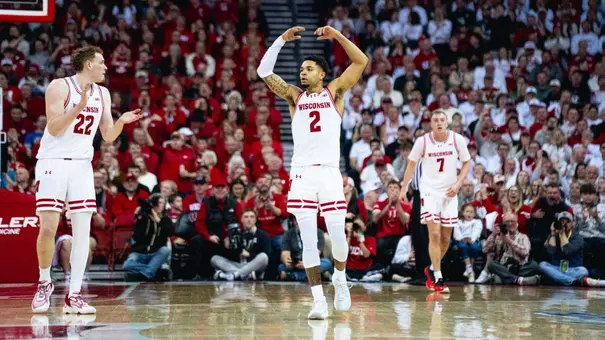
Ryan Addresses Media
December 31, 2007 | Men's Basketball
Head men's basketball coach Bo Ryan addressed the media at the UW Athletic Department's Monday news conference, discussingthe Badgers' win over Texas, their Big Ten opener on Wednesday at Michigan and a number of other topics.
Below is a complete transcript of that media session:
QUESTION #1: One of the things about Michigan is that they're similar to Northwestern in that they're difficult to prepare for. They've got some unique stuff that Coach Beilein has incorporated. Can you just talk about that and what you have to do to prepare for Michigan'
BO RYAN: Well, as you have to do for any team, you have to make sure that you're just sound. If they're going to use the 1-3-1, if they're going to do traps at it, if they're going to play man and run and jump, but whatever it is that any team does, in practice you have to have some simulation drills in order to force your players to make decisions, all right, if this happens, this is what we want to do, this is the angle we want, this is the over-low we want, this is another type of pass we're looking for, what not to dribble into, how to use the clock.
All those things you prepare pretty much for all the time anyhow. And then if the other team, sometimes the other team, if they get a turnover or two, then that gets three or four. And sometimes guys, more adrenaline is pumping, the quicker they are, their reaction time is a little bit better. So whatever you do, you have to try to simulate as much of that as you can, but it's never the same in practice. But our scout team did a pretty good job, for example, today, showing some things that Michigan has done in the past in other games this year.
QUESTION #2: . . .
RYAN: Well, you don't know. If you expect one thing and then something else comes, then you're not being fair to your team. So we just mix it up.
QUESTION #3: I guess shifting gears a little bit, with regard to your team's defense, going into Big Ten play, what would you say is kind of the strength of your team defensively at this point'
RYAN: Well, I mean, they're trying to work together, as we've always said. You're only going to be as strong as how well the parts engage themselves, so our rotations, our pinches, how we sync, how we react, our close-outs, all those, I mean, it's all, it's 20 things, not just one thing. And in order for it to create problems for the other team or to take them out of their comfort zone, which is what we're always trying to do on defense, it takes all five parts working together. And at times, we've done that pretty well.
QUESTION #4: Particularly in conference play, is that, is the defense, is that what has to be the constant, or is that maybe oversimplifying '
RYAN: Does the defense what now'
REPORTER: . . . defense have to be the constant in terms of being able to, you know, compete for a conference championship.
RYAN: Well, I don't know, you know, it 's the first game and you're always trying to get in the left-hand column, so you prepare just as you did for your non-conference games. We're not looking to February or anything. We're looking to January 2nd here and preparing for the next 40 minutes.
So it's, defense is where a lot of things can happen from, and if you 're not solid there, then you're going to have a very difficult time of ever competing for anything. So you know, our goal is always to finish as high as we can in the Big Ten, just as it is for every other team. And usually the teams that finish one, two, three or one, two, three, four are teams that have played pretty solid defense.
QUESTION #5: Is there any update on Trevon 's status'
RYAN: No. Just he's rehabbing. That 's the only info that I have. So he did not practice yesterday or today. Those are the facts so far.
QUESTION #6: Marcus continues to look like he 's really growing into the number four spot. Can you just talk about what he 's done' He had a, I thought a particularly good game against Texas in terms of letting the game come to him and doing the things that you would like to see your number four do.
RYAN: Well, I mean, yeah, he rebounds. He 's been productive around the basket. Defensively, he's really helped us on some different type players. So you know, that's what we're looking for. And I just try to, when we get these guys into practice, we're always trying to get them to understand the little things, and Marcus is always receptive. He's trying to get better every day, and that's what you have to have. So that 's why he has shown improvement, because he wants to learn.
QUESTION #7: Coach, the team is ranked 25th this week in the AP poll. Can you describe the mentality going into the conference schedule after the big, you know, win Saturday night and then this ranking' How confident do you feel your team is going into conference play'
RYAN: Well, I didn't know anything about the ranking, and I've never looked personally, so it won't affect how we do things. And you're only as good as your next one, so I don't, I mean, it's a, yeah, that's, anytime you get on the road and win, let alone beating a team that was playing as well as Texas has been playing, and now Michigan presents different problems and that's what we look at. There's not a whole lot of reference to our last game, other than try to take the good things and keep improving upon them and try to get even better.
And then the other team that we're playing happens to be Michigan. They 're going to try to, they're going to look at that film and other films and say, okay, this is what Wisconsin does well, we've got to take this away from them, the same way we're trying to look at Michigan and say, okay, what's their strengths, what can we take away. So the ranking thing, that doesn't have an impact at all with us in anything that I do as a coach.
QUESTION #8: Bo, I know you spoke about this on your TV show yesterday, but for radio purposes, just the Big Ten schedule, playing 18, and a good thing for you. You like it, obviously, players, fans, everybody involved, wouldn 't you say'
RYAN: Yeah, because it's familiar teams. It's pretty much, you know, when he's league play, it's, well, we played these guys, how many times has Wisconsin played Michigan' Is that what it is' So there's some familiarity there, so I think, that 's the other thing about conference play.
And conference teams, the RPI is usually pretty good, so that's a statistic that means, it seems to mean a lot more to people as the season goes on, so that one I talk about because it's kind of strength of schedule, where you're playing, who you played and how you've done on the road, what you're doing at home, etc.
So conference play is good, and it's people who your fans, our players, students, everybody around the program, alumni, they, oh, they're playing Michigan, oh, they're playing Indiana, oh, okay. So that's what you have in conference play, and that's good. This will be the 145th. That's a lot of games between two teams.
QUESTION #9: On Saturday, was that one of the better games you've seen Brian Butch play'
RYAN: Yeah, I thought Brian was pretty consistent. I hope he's got a lot more good games in him. So we'll certainly take what he did in that one and celebrate for, I think we, the plane touch down and then we're getting ready for Michigan, so all that's over. And Brian played well, and he's definitely working at trying to be the complete player that everybody always wants to be, no matter who you are, whether you're Brian or Mike or Kevin or anybody else.
As long as in practice I see guys working at things, then we're in pretty good shape. Brian was working again these past two days. He didn't change his work habits as a result of what he did against Texas.
QUESTION #10: Without Trevon on Saturday, Jason Bohannon was one of the guys who had to do a little more with the ball, and it seemed like there were some stretches where he made some key plays . . . not just from three-point range, but, you know, in putting the ball on the floor and making something happen, can you talk about, you know, that aspect of his play and, I mean, obviously it was a big help for you, but just, you know, what kind of, that may mean for you without Trevon possibly.
RYAN: Well, I mean, J-Bo is a player, so, you know, he's always, that's his responsibility as a guard at his position to make plays, to hit shots, to defend. So when guys do it, I'm not surprised. It 's just, okay, now what you do as an individual on a team is what else can I bring, what else can I do, what else can I make happen that'll make our team better. And that's all I'm ever looking for, and J-Bo always brings that.
QUESTION #11: You asked rhetorically last week, you know, when it came to turnovers, what's better, shooting 49% and turning it over 18 times or shooting 42% and turning it over 10. Well, you shot 42% and turned it over 10 against Texas. Is that, does that say something . . .
RYAN: You think I was looking in a crystal ball or something' Is that what you're going to try to insinuate'
REPORTER: I was going to say, does that kind of go toward answering that question . . .
RYAN: Well, I mean, those are statistics. It 's sometimes you're on the short end in the rebounding and you win a game. Sometimes you've got 10 more rebounds than the other team and you take a bump. Those are stats and makes your job easier because you get to write about, there it is, oh, look, they did this or they didn't do that. I mean, that's great for you guys, but it also helps us in that we're trying in certain statistics to be very, very consistent as all teams are.
And, you know, when a team is done playing, you can break it down any way you want, but the players play and they're going to get results. They're going to either get X number of rebounds, X number of steals, X number of turnovers, and it 's life. It develops right in front of your eyes. So what happens with a stat is that the most important one is going to be did you come out on the left-hand side. What does it take to be on the left-hand side, so you break all those things down. So I don 't know which one is better. I threw it out as a question because nobody ever has the 100 percent answer. Did I dance around that well enough, or do I have to . . .
REPORTER: But when you broke down what you did offensively and in terms of your efficiency, was it a bunch of different things, like making harder cuts, making better decisions, what all led to what you saw becoming a more efficient team against Texas'
RYAN: Well, I just think we were consistent. We just, we didn't, we had a couple of spurts where we made a couple bad decisions. They came down and hit some threes, and that's when they opened up that eight-point lead. But you've got to give our guys credit to say then we stared that down and J-Bo comes back and hits a three. We get a post feed to Kevin from Greg Stiemsma. We get a three-point play there, opportunity.
So we kept chipping at it, and we didn't get discouraged. That was the most important thing, because they could have, when they hit that one streak, they've done that to teams. They jump out like that and then bring even more because they 're not going to slow down on the offense. They're going to still look to shoot the threes, crash the boards, create a turnover that leads to a bucket.
QUESTION #12: That's why I thought what you did at the end of the first half was important, because by closing it up and tying it at the half, that run that they made wasn't as substantial as it could have been. Is there . . .
RYAN: I mean, didn't we beat the Texas game to death by now' The only thing left to answer is Brian's question, when has a team ever gone on the road and beaten a ranked team in the top 10 having lost 12 hours the night before they're leading scorer and won. Brian thinks he's on to something. It might have never happened.
QUESTION #13: What do you remember from the last time you beat a top 10 team on the road'
RYAN: Well, I just remember Wes [Matthews] having a real good game. I remember a couple things. He had five assists, six turnovers. But that was Wes. He could make some great plays and he could, you know, maybe overextend somewhat, but I remember [Larry] Petty and [Joe] Chrnelich playing 40 minutes apiece. That 's quite an accomplishment when you're playing against Herb Williams and Clark Kellogg and those guys.
I remember Ohio State had Virginia coming in, and Ralph Sampson and them were coming in. That wasn't real smart for a Big Ten team to play and then have a national TV game on a Sunday, but that's how they did it back then. And we ended up with one more point than they did. 1980 seems like a long time ago. My hair was a lot darker then. I know I remember that, and had more of it too, yeah.
QUESTION #14: You kind of touched on, you know, the fact that you guys had to deal with Trevon . . .
RYAN: And [Dan] Hastings had a sprained ankle, and [Greg] Dandridge and [John] Bailey helped at the guard spot. I think Clyde [Gaines] was 2-for-2 from the floor. I don't think Clyde had any assists. He had one turnover, I think. But we got some help from Dandridge and Bailey at guard. Go ahead, Mark. I didn 't mean to, see, these things just flash, they flash into my head.
REPORTER: You were touching on the fact that you guys had to play on without Trevon and the fact that, you know, the challenge of doing that, you know, just 12 hours after, you know, you lost him. Now this time, you know, if he can't play, you've got two days. I'm just curious, what does, you know, those two days afford you a chance to do that maybe you weren't able to do with 12 hours in terms of getting people ready'
RYAN: Well, I mean, the way we run our practices, we get ready for anything that's going to happen, so that's what I was saying before about what you do in practice. And, you know, some of us look at practice a little bit different than, say, A.I. I mean, I think it's extremely important that you work different things so that if somebody gets in foul trouble, so when we sub in practice, sometimes I'll say, okay, Joe just picked up his fourth foul, this is what we have to do, all right, so somebody else is bringing it in or somebody is doing this.
So those are things that we do in practice, and the facts are that he misses two days of timing and teaching on the floor, even though he was there watching and on the sideline where I stand. And it meant that some other guys on the floor obviously got more possessions than they normally would in practice. So you've got to look at it on one hand, saying, okay, somebody else just got more experience, or a combination of guys, but Trevon loses experience.
QUESTION #15: We've seen it a million times, of a team loses a key player and they rise to the occasion for that first game afterward, but then it's not sustainable. Why is that' Why is it a one-game thing and then there's a drop-off sometimes, oftentimes'
RYAN: Well, I don't know. I don 't know the percentages. I don't know if you have those numbers of how many times it happens one way or the other. It's just a fact of life that you play on. By the time guys get to be this age and this level of experience, they've gone through this in high school.
They've gone through this probably in Bitty League or AAU or where somebody gets hurt and you've got to fill in or somebody's mom or dad pulled a guy off the team and said he wasn't getting enough shots. How many more scenarios do you want me to create' There's a lot of this stuff that happens to these guys, so they're flexible. Guys are flexible. They learn to adapt.













